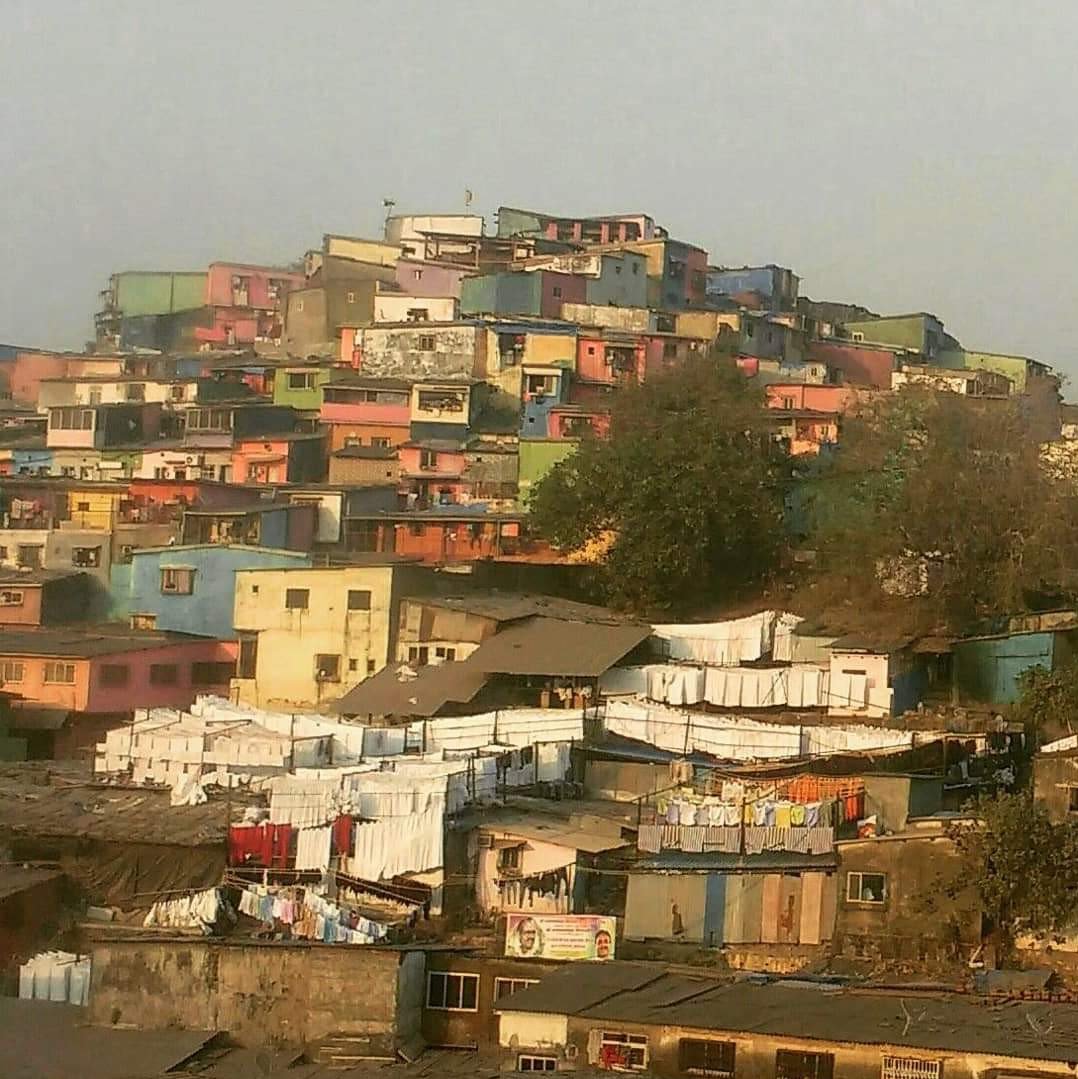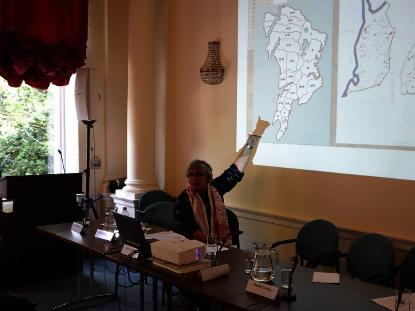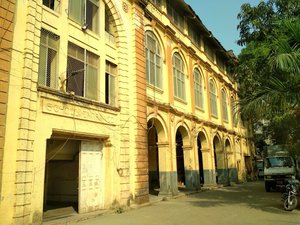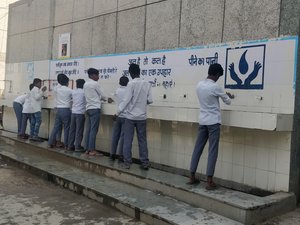
The research group examines the relationship between education and the many aspects of the urban as a category – including urbanization, societal change, and urban culture – in a society that has undergone rapid and complex processes of urbanization in the seven decades since independence from colonial rule in 1947. A special focus of the group is on marginalization and its relationship with education and the urban. The project takes a multi-sited approach to understanding the way in which marginalization in education is configured in the urban space. The core group consists of four principal researchers who investigate specific aspects of education in four different cities of India (Bengaluru, Delhi, Mumbai, and Kolkata), along with postdoctoral researchers and a network of scholars working on the theme in both larger and smaller urban centres. External scholars are invited to take part in conferences and workshops and contribute to the working papers on the theme.

Related publications
Working Paper Series
Anusua Chatterjee, ‘Exclusion, Urbanity and Education: A Case Study of a Muslim Neighbourhood in Kolkata’,
Education and the Urban in India – Working Paper Series 2019/1 [open access]
Jyotsna Jha and Puja Minni, ‘Bridging Old Gaps, Building New Barriers: A Study of Online Admissions under the Right to Education Act in Bangalore Urban Private Unaided Schools’,
Education and the Urban in India – Working Paper Series 2019/2 [open access]
Farah Farooqi, ‘Understanding Life and Education in an Urban 'Ghetto': Shafiq Memorial and Bara Hindu Rao, Delhi’,
Education and the Urban in India – Working Paper Series 2019/3 [open access]
Nirmali Goswami, ‘“Ours is a semi-English medium school”: Schooling aspirations and a neighbourhood school in Banaras’,
Education and the Urban in India – Working Paper Series 2019/4 [open access]
Archana Mehendale and Swagata Raha, ‘Schools as Safe Spaces: An Analysis of Public Narratives and Policy Actions in Bengaluru’,
Education and the Urban in India – Working Paper Series, 2020/5 [open access]
Sadhna Saxena, ‘Changing Urban Education Trends: Case Study of a ‘Small Town’ in Madhya Pradesh’,
Education and the Urban in India – Working Paper Series, 2020/6 [open access]
Yamini Agarwal, ‘Urban Marginalization, Exclusion and Education: The Widows’ Colony in Delhi’,
Education and the Urban in India – Working Paper Series, 2020/7 [open access]
Razak Khan, ‘Place of Knowledge: Education and Urban History in Rampur’,
Education and the Urban in India – Working Paper Series, 2021/8 [open access]
Geetha B. Nambissan, ‘The Changing Urban and Education in Delhi : Privilege and Exclusion in a Megacity’,
Education and the Urban in India – Working Paper Series, 2021/9 [open access]
Akash Bhattacharya, ‘Urbanizing Uttarpara : Philanthropy, Improvement, Education, c.1846 to c.1865’,
Education and the Urban in India – Working Paper Series, 2021/10 [open access]
Nandini Manjrekar and Poushali Basak, ‘Public Education in Bombay’s Mill District in the Early Twentieth Century’,
Education and the Urban in India – Working Paper Series, 2021/11 [open access]
Debarati Bagchi, ‘Education Hub in Sonipat : Exploring the Land-University Nexus’,
Education and the Urban in India – Working Paper Series, 2021/12 [open access]
Mythili Ramchand, ‘Schooling the Urban Poor : Engaging with Teachers’,
Education and the Urban in India – Working Paper Series, 2021/13 [open access]
Shivali Tukdeo and Amar Mali, ‘Urban Dislocations and the Politics of Educational Access : Metro Colonies, Bengaluru’,
Education and the Urban in India – Working Paper Series, 2021/14 [open access]
Nandini Manjrekar, Gender and Education in India (New Delhi, 2020)
Shivali Tukdeo, India goes to School. Education Policy and Cultural Politics (New Delhi, 2019)
Geetha B. Nambissan, ‘The “Urban” and Education in India: Section Editor’s Introduction’, in William T. Pink and George W. Noblit (eds.), Second International Handbook of Urban Education, vol.1 (Cham, 2017)
Geetha B. Nambissan, ‘Poverty, Markets and Elementary Education in India’, TRG Poverty & Education in India Working Paper Series, 3 (2014) [https://www.ghil.ac.uk/fileadmin/redaktion/dokumente/trg_india/Paper_3_Geetha_Nambissan.pdf]
Sub-Projects

Sub-Project
Public Education in an Industrial City: Bombay, 1900 to 1945
Nandini Manjrekar (Principal Investigator) and Poushali Basak (TISS, Mumbai)
The project studies the growth of primary education in Girangaon, the mill district of Bombay, between 1900 and 1945, against the backdrop of debates among the city’s bureaucracy represented by the Bombay Municipal Corporation, the city’s elites comprising nationalist leaders, mill owners and elected representatives, and the growing and increasingly politicized industrial workforce.
Read more
Bombay (now Mumbai) was India’s foremost industrial city in the early 20th century, largely owing to the concentration of textile mills in the city. Many scholars have drawn attention to the ways in which the mills came to constitute the city in many respects and influenced policies related to its growth. The project looks at the growth of primary education in Girangaon, the mill district of Bombay, between 1900 and 1945, against the backdrop of debates among the city’s bureaucracy represented by the Bombay Municipal Corporation, the city’s elites comprising nationalist leaders, mill-owners and elected representatives, and the growing and increasingly politicized industrial workforce. We explore the various discourses around the education of children of the industrial workforce – in particular, the setting up of schools in the mill district, commonly called Girangaon, by the Bombay Municipal Corporation (BMC). The BMC schools offered instruction in nine languages, which was a striking reflection of the diversity of the workforce migrating from various regions of the country into Bombay for employment in the city’s mills. Many of these schools still exist, albeit in much altered form, having survived the impact of de-industrialization in the area following the historic mill strike of the mid 1980s and the gradual closure of the mills since the 1990s. While there is a large body of scholarship on the Bombay mills and their relation to the city, worker organizations, welfare, and rights, as well as the social and cultural lives of workers, the dimension of public schooling policies in the area has not been studied through a historical lens. The study is an archival project, drawing on available educational records of the BMC and other organizations invested in workers’ welfare in the city of Bombay.

Sub-Project
The Changing Urban, Educational Aspirations, and Opportunities: Perspectives from the Margins of Delhi City
Geetha B. Nambissan (Principal Investigator) (JNU, New Delhi)
This project maps the rapidly changing urban and educational landscape in the city of Delhi. It investigates the implications of these changes for the aspirations and strategies of poor migrants on the margins of the city, who have experienced economic and social vulnerability because of poverty and marginalized identities of caste, gender, and ethnic minority status.
Read more
This project maps the rapidly changing urban and educational landscape in the city of Delhi. It investigates the implications of these changes for the aspirations and strategies of poor migrants, such as Dalits and Muslims, on the margins of the city, who have experienced economic and social vulnerability because of poverty and marginalized identities of caste and minority status. The study is based on a review of relevant secondary research on Delhi in order to map urban transformations and changes in the systems of schooling (public and private) that the city has witnessed, and examines how this has led to privilege and disadvantage for its inhabitants. The project analyses what these changes have meant for children's schooling opportunities, aspirations and future life chances.
Sub-Project
Ethnicity, Aspirations and Education: A Study of Young Women from the North-East Region Residing in an Urban Village in Delhi
Geetha B. Nambissan (Principal Investigator) and Yamini Agarwal (Junior Research Associate) (JNU/ Max Weber Foundation India Branch Offcie New Delhi)
Based on a case study of 10–15 young migrant women from north-eastern India living in an urban village – Munirka – in Delhi, the study analyses how ethnicity and gender mediate their day-to-day lives in the neighbourhood, the city, and its institutions, as well as the strategies adopted by these migrants to access education and work, to ‘fit in’ and to create a social space of their own.
Read more
An important strand of urban migration is that of young people who aspire to the better educational and professional opportunities that the city is believed to offer. As a centre of administrative, bureaucratic, and professional opportunities and high-quality educational institutions, Delhi is particularly attractive. A sizeable number of those who come to Delhi for this purpose are young migrants from the north-eastern states of India, where educational institutions are inadequate and of relatively poor quality. Youth from this region find accommodation in what are classified as ‘urban villages’ within Delhi. These are former villages engulfed by the city where lax building norms have provided opportunities for affordable rent and led to a transformation of these spaces, making them a unique mix of the rural and urban. Fragmentary research on migrants from the north-east in Delhi and newspaper reports point to the verbal and physical violence that they face within the city because of stereotypes and prejudices that prevail about the region they come from and its culture. Women in particular are subject to sexual harassment as well. Yet we find an increasing number of young people coming to Delhi from the different states in the north-east to access the education and occupations that the city offers.
The study focuses on 10–15 young migrant women from north-eastern India living in an urban village – Munirka – in Delhi, which has been transformed primarily because of the relatively cheap accommodation that it offers. The project explores the journeys of these women from their states of origin to Delhi, their struggles to find a place to live, their access to education/occupations, and their efforts to make a home in the city. The project attempts to understand how ethnicity and gender mediate their day-to-day lives in the neighbourhood, the city, and its institutions, and their strategies to ‘fit in’and to create a social space of their own. Perceptions of the north-east and of young people from this region will also be explored through interviews with key individials in the urban village.
Sub-Project
Urban Dislocations and Educational Strategies: Metro Colonies, Bengaluru
Shivali Tukdeo (Principal Investigator) and Amar Mali (Research Assistant) (NIAS, Bengaluru)
The project looks at the forced relocation of two poor settlements to the periphery of Bengaluru in the wake of the construction of the Metro train service, and the ways in which these uprooted communities plan their children’s education in their new settlements on the margins of the city.
Read more
Displacements, eviction, and rehabilitation have become common aspects of urban development initiatives. By focusing on restructuring of the city of Bengaluru over the last decade, especially in the context of new modes of transportation, this project pays close attention to two rehabilitated neighbourhoods in the city.
Metro train projects have been a signature feature of post-2000 development in Indian cities, starting with initial operations in Delhi, Kolkata, and Bengaluru and moving gradually to other cities. Capital-intensive projects such as the Metro system highlight the linkages between public transportation, infrastructure-driven development, and new ways of accessing the city. While construction was underway, the Bangalore Metro Rail Corporation Limited (BMRCL) proceeded to acquire land in the city. Two centrally located and densely populated settlements were cleared out and relocated to the periphery of the city. For the residents of these Bastis, the dislocation meant two contrasting realities: the loss of their social world on the one hand, and new opportunities to make a living and acquire certain material resources as part of compensatory processes on the other. The following questions inform our project: how do families start over in an ever-changing city like Bengaluru? In what ways does dis/relocation create new margins that link to the city? How do the resettled families engage with educational planning and school preparedness? Our interest in the project stems from issues that are of contemporary relevance, but urban eviction and its aftermath in terms of rehabilitation and resettlement has long been connected to urban reforms and transformation. Research in a number of domains, including urban informality, spatial reorganization, development, and shifts in public provisioning, offer productive engagements for education and the urban in the context of the life of Bengaluru.
 Education and the Urban in India since the 19th Century
Education and the Urban in India since the 19th Century